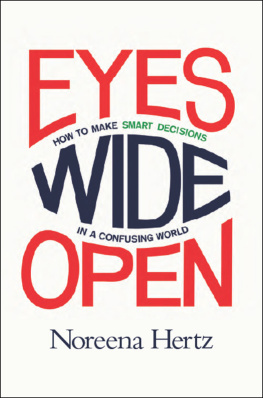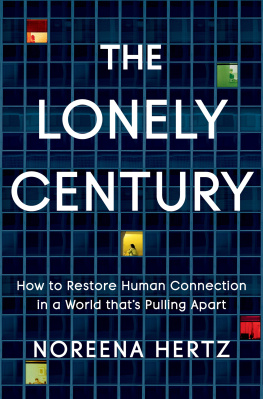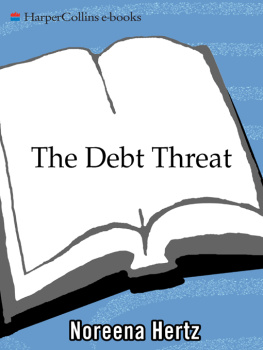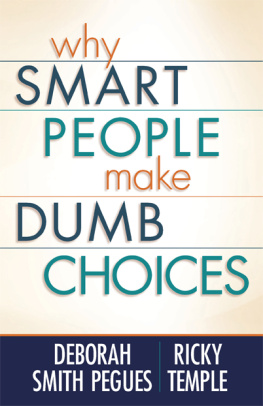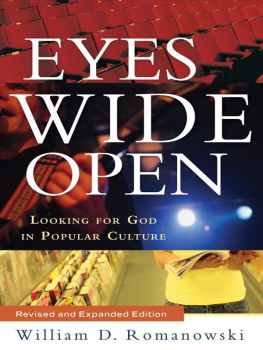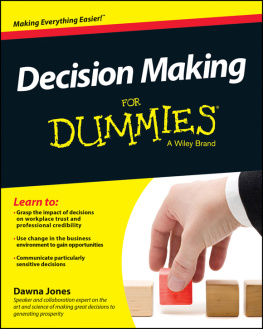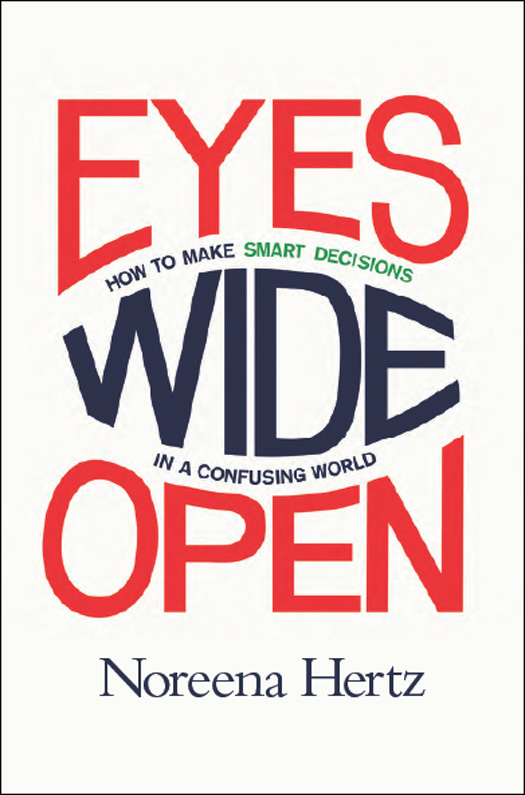To Danny Cohen the best decision I ever made
Contents
Its Monday morning.
In Washington, the President of the United States is sitting in the Oval Office assessing whether or not to order a military strike on Iran.
In Idaho, Warren Buffett is deciding whether to sell his Coca-Cola shares or buy more.
In Madrid, Maria Gonzalez, a mother, is trying to work out whether to let her baby continue crying until he falls asleep, or pick him up and soothe him.
I am sitting by my fathers bedside in hospital, trying to decide whether I should let the doctor operate, or wait another twenty-four hours.
We face momentous decisions with important consequences throughout our lives. Difficult and challenging problems that we are given the sole responsibility to solve.
On top of this, we have to make up to 10,000 trivial decisions every single day, Caffeinated or decaf? Small, medium, large or extra large? Colombian, Ecuadorian, Ethiopian? Hazelnut, vanilla or unflavoured? Cream or milk? Brown sugar or sweetener?
If you make the wrong choice when it comes to your coffee, it doesnt matter very much. You make a face and move on.
But make the wrong choice when it comes to your finances, your health or your work, and you could end up sicker or poorer, or lose your job. And if your decisions relate to others your parents, your children, your country or your staff the choices you make can irreversibly impact the direction their lives will take too. Not only today, but in the months and years ahead.
Errors in decision-making lead young people to under-save for retirement, doctors to miss tumours, CEOs to make catastrophic investments, governments to engage in needless wars, and parents to irreversibly traumatise their children.
This book is about how to make better choices and smarter decisions when the stakes are high and the outcome really matters whether you are a politician, a businessperson, a professional or a parent.
Think Yourself Smarter
Its actually very surprising how little we think about the quality of our decision-making and how we could improve it. How absent decision-making classes are from educational curricula.
How little we think about how it is we think.
Ask most people why they came to a certain decision, and watch them stumble. How we come to our own assessments, how we arrive at our predictions and choices, are things we seldom scrutinise.
For the sake of our health, our wealth and our future security, we must take it upon ourselves to challenge the way we make our decisions. Its a matter of self-empowerment.
If we do not want to be victims of a future that others dictate to us, we need to get better at making choices with our eyes wide open, our brains switched on.
This means getting better at collecting, filtering and processing information, getting smarter at establishing who to trust and whose recommendations to take on board, getting more adept at analysing different options and weighing up divergent opinions. It also demands that we forge a clearer sense of how it is we come to make decisions that we understand how our emotions, feelings, moods and memories affect our choices. And that we better know and understand our environment, so that we can master its particular challenges as well.
More specifically, we need to come to terms with three powerful ways in which the environment we now live in can inhibit our ability to think smartly and choose wisely.
Drowning in the Deluge
For this is the age of data deluge.
An age in which advertisers, marketers and media outlets tweet us, text us, and follow us online. An age of Facebook News Feeds and Amazon Recommends. An age in which we are overwhelmed with information, increasingly to the breaking point.
A New York Times Weekly Edition contains more information than the average person in the seventeenth century was likely to come across in their entire lifetime.
Our stone-age bodies cant cope with this modern-day deluge. Evolution is slow; the deluge has come fast. Confronted with data some dodgy, some not our hearts beat faster, our breath becomes more shallow, we sweat: the deluge makes our body shift into crisis mode.
Studies reveal that we cant hold more than seven separate pieces of information in our minds at once. The best answer to our query might not be there, but we cant cope with more.
How can we find the space to think clearly, with all of this data raining down on us? How can we discern intelligence from all this noise?
For there is intelligence amidst the cacophony. In fact, the data deluge has a notable upside: we can now get our information raw, unedited, uncurated. We can now imbibe information direct from source, without the traditional gatekeepers.
This offers a huge opportunity to us as decision-makers. But the question of what, among all the data swirling around the digital landscape, we should give credence to is not straightforward to answer.
In London in August 2011, huge numbers of people rioted, and parts of the city went up in flames. Shops were emptied of expensive trainers and wide-screen TVs. The police looked on powerlessly.
It wasnt that there was no information. Tuned in to social media, police command centres were overwhelmed by the 2.6 million riot-related tweets that circulated during the five days of rioting.
The tales circulating the Twittersphere were plentiful and varied from the political to something more akin to a childs picture-book: rioters breaking into a branch of McDonalds to cook their own food, the London Eye being set on fire, a tiger being set free from London Zoo.
The problem was, in the face of so much information, how could the police work out which stories to trust and which to reject? Which leads should manpower be assigned to investigate? Which should be ignored?
All of those tweets mentioned above turned out to be false, by the way.
In the age of data deluge, with information so fractured and diffuse, and arising from so many disparate sources, how do we know what to believe and what to reject, so we are able to benefit from the digital dividend? That is a challenge that this book will address.
Drip, Drip, Drip, Ping, Ding, Ring
Add to the barrage of data another twenty-first-century form of Chinese water torture the drip, drip, drip of Continuous Disruption and youll be better able to understand the demanding context within which we make our decisions.
In this regard, email is Mental Enemy No. 1. The constant pinging, window signalling or green light blinking, depending which medium it finds you on.
Some saw it coming, saw the inherent problem of a medium which could so easily get out of control.
In 1984, just as email was beginning to enter the mainstream, Jacob Palme, a computer scientist from the QZ Computer Centre at the University of Stockholm with a sideline in writing crime novels, warned that an electronic mail system, if used by many people, causes severe information overload problems.
The cause of this problem [Palme wrote] is that it is so easy to send a message to a large number of people, and that systems are often designed to give the sender too much control of the communication process, and the receiver too little control... In the future, when we get larger and larger message systems, and these systems get more and more interconnected, this will be a problem for almost all users of these systems.

